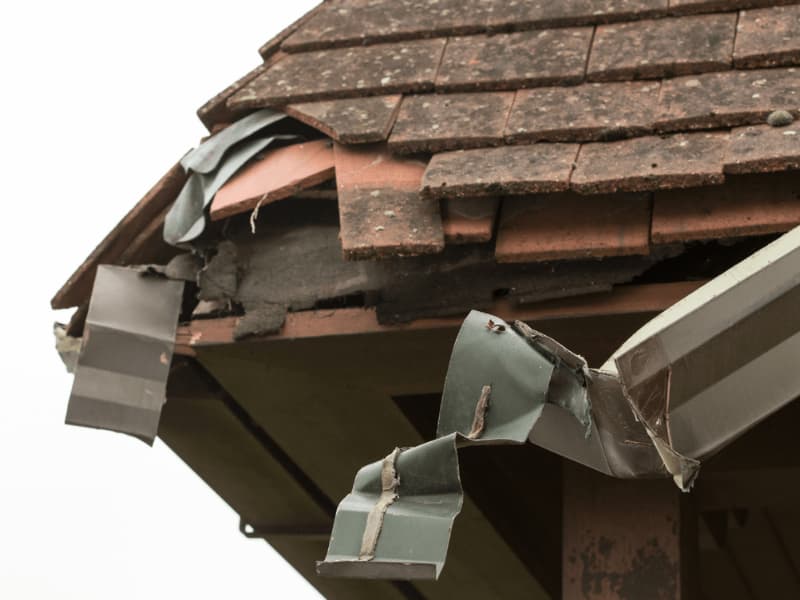A roofing system isn’t complete without gutters. Gutter issues arise over time, like other roofing system components, if not properly maintained. Poorly working gutters result in various problems, such as water leaking. Knowing the type of damage on the roof and how to fix it are important in keeping your roof and house in good shape.
The main types of gutter damage are weather damage, gutter clogging, overflowing, rodent damage, poorly installed, and poor quality gutters. You can fix these issues by choosing quality gutter materials and an experienced roof mechanic.
Ignoring gutter troubles could turn out to be a costly error. Call your roofing contractor as soon as possible to prevent worsening the situation. Repairing gutters as soon as they fail can solve current difficulties and stop future ones.

What can cause damage to a gutter?
Keeping your gutters clean and clear of dirt is not that difficult. To identify issues, you don’t need to monitor them constantly. All that is required is adherence to a maintenance program. Failure to do so can lead to damage and high roof replacement costs in the long term.
The types of damage to a gutter system include the following:
1. Poor installation
No matter the type of gutters you use, they are more susceptible to damage if they aren’t fitted correctly. This can create problems such as an unsuitable slope, incorrect hanger-to-hanger distance, and low-quality materials. Your gutters’ long-term function and durability depend on proper installation.
Solution
It’s crucial to pick a trustworthy gutter installation provider to guarantee that your gutters are done correctly. Before deciding, do some research and acquire a few quotations. Learn more about a company’s reputation, contact references, and read their web reviews.
2. Weather damage
Standard galvanized steel gutters are particularly susceptible to weather damage, which results in dents and punctures.
Solution
Investing in a durable material like copper can reduce rain-hail damage. Watch the gutter hangers and replace them if damaged by the weather.
3. Gutter clogging
Clogged gutters are a common cause of gutter damage. If filled with leaves, twigs, and other debris, your gutters cannot perform as intended. This causes gutters to sag or even come off due to the weight of the debris, necessitating expensive repairs.
In addition, blocked gutters can also result in water accumulating on your roof, resulting in water damage. The incorrect use of strip or box miters can also lead to the same.
Solution
To avoid blockages, you should clear your gutters frequently, ideally twice a year. To make the process easier, get a gutter cleaning tool or use a ladder with gloves and remove the debris by hand.
You should also hire a professional gutter cleaning service if your gutters are too high to climb safely.
4. Poor quality gutters
Choosing inferior materials for your gutter system might cause it to age prematurely. Investing in high-quality materials is crucial to ensure that your gutters are strong and long-lasting.
Solution
Since seamless gutters are less prone to leaks and other damage than traditional gutters, I advise installing a seamless gutter system. Choose the most durable material you can find, such as steel or copper.
5. Overflow
Water overflows from your gutters will damage your house or property. This involves erosion in your landscaping and water damage to your roof, walls, and foundation.
Solution
It’s crucial to maintain clean, functional gutters to avoid water overflow. Chances are your gutters may be clogged if you keep experiencing overflows during periods of heavy rain.
The gutters may be too tiny, assuming you get your gutters cleaned twice a year. The appropriate gutter size would be best considering the local rainfall and roof slope.
Ensure you get a gutter size matching the hill; the steeper the pitch, the quicker it drains rainwater.
6. Rodents
Birds, squirrels, rodents, and other animals can harm your gutters. Your gutters may become clogged with pine needles, other debris, and other things due to birds making nests there. Rats and squirrels may gnaw on the gutter material, hangers, and brackets.
Solution
You can prevent animals from damaging your gutters by installing gutter guards or spike strips over the top of your gutters. Believe it or not, some people even successfully use decoys, such as owl decoys, to deter birds from their gutters.
Conclusion
Gutter damage may result from a variety of factors. The most frequent ones have blocked gutters, subpar construction, careless upkeep, snow and ice, water overflow, advancing age, trees, animals, weather damage, and low-quality building materials.
You can take action to prevent gutter damage and maintain the quality of your gutters by being aware of these factors. Schedule routine maintenance and prompt repairs to safeguard your house and maintain its value.
Frequently Asked Questions
What damage can bad gutters cause?
When gutters get clogged, they can send water into your basement, leading to floods and a weak foundation. In the long run, the foundation of your house will become weak.
What is the most common problem with gutters?
Clogging is the most common problem with gutters. Clogged gutters allow water to damage the house in various areas, such as the roof, foundation, and basement.
What are some signs that your gutters need to be replaced?
Your gutters will need replacing if you see gaps, standing water, peeling paint, water damage marks, soil erosion around the house, overflowing water, loose screws and nails, foundation problems, mold, rust, sagging gutters, and fractures on the house.
